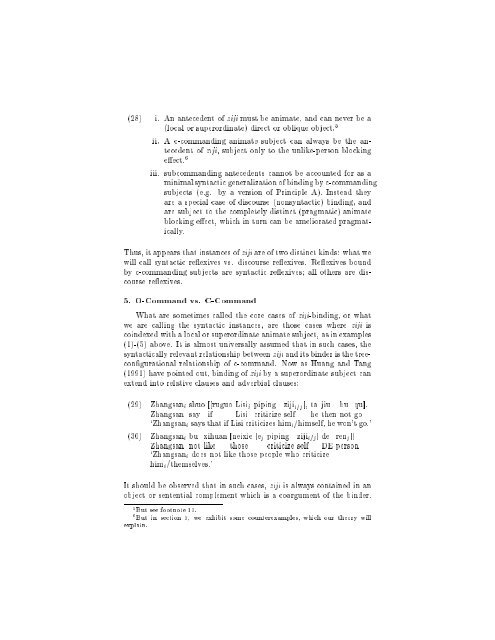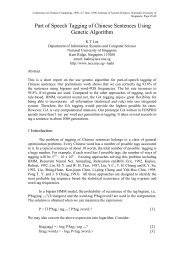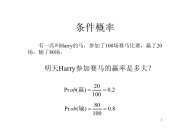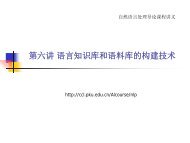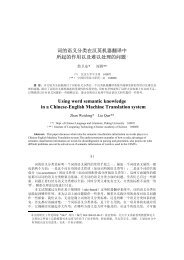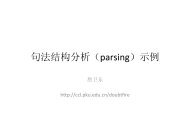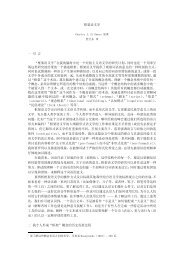A New Perspective On Chinese ZIJI
A New Perspective On Chinese ZIJI
A New Perspective On Chinese ZIJI
Create successful ePaper yourself
Turn your PDF publications into a flip-book with our unique Google optimized e-Paper software.
(28) i. An antecedent ofziji must be animate, and can never be a<br />
(local or superordinate) direct or oblique object. 5<br />
ii. A c-commanding animate subject can always be the antecedent<br />
ofziji, subject only to the unlike-person blocking<br />
e ect. 6<br />
iii. subcommanding antecedents cannot be accounted for as a<br />
minimalsyntactic generalization of binding by c-commanding<br />
subjects (e.g. by aversion of Principle A). Instead they<br />
are a special case of discourse (nonsyntactic) binding, and<br />
are subject to the completely distinct (pragmatic) animate<br />
blocking e ect, which in turn can be ameliorated pragmatically.<br />
Thus, it appears that instances of ziji are of two distinct kinds: what we<br />
will call syntactic re exives vs. discourse re exives. Re exives bound<br />
by c-commanding subjects are syntactic re exives all others are discourse<br />
re exives.<br />
5. O-Command vs. C-Command<br />
What are sometimes called the core cases of ziji-binding, or what<br />
we are calling the syntactic instances, are those cases where ziji is<br />
coindexed with a local or superordinate animate subject, as in examples<br />
(1)-(5) above. It is almost universally assumed that in such cases, the<br />
syntactically relevant relationship between ziji and its binder is the treecon<br />
gurational relationship of c-command. Now as Huang and Tang<br />
(1991) have pointed out, binding of ziji by a superordinate subject can<br />
extend into relative clauses and adverbial clauses:<br />
(29) Zhangsani shuo [[ruguo Lisij piping zijii=j], ta jiu bu qu].<br />
Zhangsan say if Lisi criticize self he then not go<br />
`Zhangsani says that if Lisi criticizes himi/himself, he won't go.'<br />
(30) Zhangsani bu xihuan [neixie [ej piping zijii=j] de renj]] Zhangsan not like those criticize self DE person<br />
`Zhangsani does not like those people who criticize<br />
himi/themselves.' It should be observed that in such cases, ziji is always contained in an<br />
object or sentential complement which is a coargument of the binder.<br />
5 But see footnote 10.<br />
6 But in section 5, we exhibit some counterexamples, which our theory will<br />
explain.


